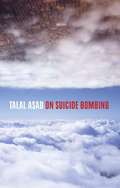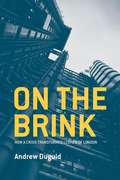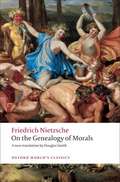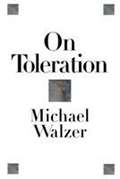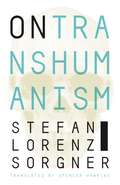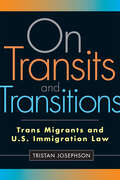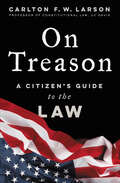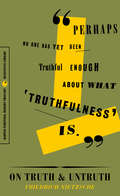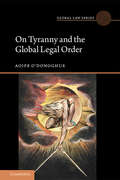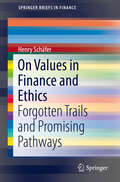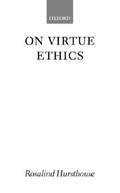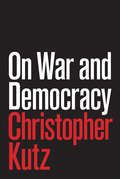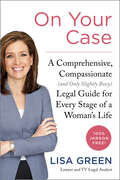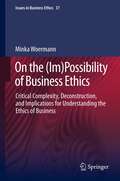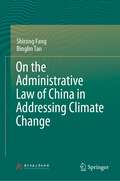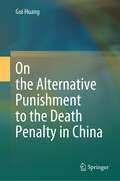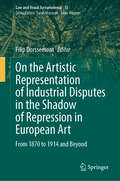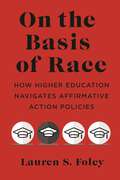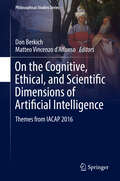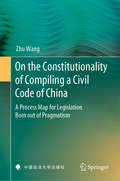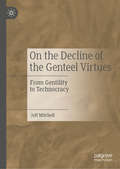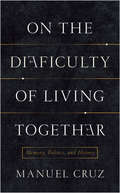- Table View
- List View
On Suicide Bombing (The Wellek Library Lectures)
by Talal AsadLike many people in America and around the world, Talal Asad experienced the events of September 11, 2001, largely through the media and the emotional response of others. For many non-Muslims, "the suicide bomber" quickly became the icon of "an Islamic culture of death"-a conceptual leap that struck Asad as problematic. Is there a "religiously-motivated terrorism?" If so, how does it differ from other cruelties? What makes its motivation "religious"? Where does it stand in relation to other forms of collective violence?Drawing on his extensive scholarship in the study of secular and religious traditions as well as his understanding of social, political, and anthropological theory and research, Asad questions Western assumptions regarding death and killing. He scrutinizes the idea of a "clash of civilizations," the claim that "Islamic jihadism" is the essence of modern terror, and the arguments put forward by liberals to justify war in our time. He critically engages with a range of explanations of suicide terrorism, exploring many writers' preoccupation with the motives of perpetrators. In conclusion, Asad examines our emotional response to suicide (including suicide terrorism) and the horror it invokes.On Suicide Bombing is an original and provocative analysis critiquing the work of intellectuals from both the left and the right. Though fighting evil is an old concept, it has found new and disturbing expressions in our contemporary "war on terror." For Asad, it is critical that we remain aware of the forces shaping the discourse surrounding this mode of violence, and by questioning our assumptions about morally good and morally evil ways of killing, he illuminates the fragile contradictions that are a part of our modern subjectivity.
On The Brink
by Andrew DuguidThis is the story of how huge losses very nearly destroyed a revered British institution, Lloyd's of London, the world's largest insurance market; how outraged members challenged a complacent institution; and how it changed to confront and overcome its biggest ever crisis. Ten thousand people faced huge personal bills they thought profoundly unfair. They were trapped; there was no escape. The market that insured disasters had become a disaster for its members. The story of Lloyd's is relevant now, raising many contemporary issues: levels of professional competence, trust, negligence, perverse incentives, and responsibilities owed by insiders to outside investors. High rewards contrast sharply with disastrous results. It raises the legitimacy of governing institutions, the right degree and form of self-regulation and the role of government. It illuminates the limits of tolerance, the power of anger, and its limitations. The search for justice shines a light on the workings of the English and US legal systems. Fairness is pitted against commercial expediency. Old attitudes clash with new circumstances. Leadership is critical in building trust and deciding when to compromise. Fresh thinking, new structures and new skills are all needed to find a way to balance the interests of past and future stakeholders. Persuasion has to overcome alternative analysis, misunderstanding, anger and inertia. Engagement of opposing parties proves critical. The issues illustrated by this story arise each day in Britain, the US and elsewhere. On the Brink is a true story of strong characters, changing fortunes, contrasting values, incompetence, real experts, self-help, creative compromise, innovation and change. It is the story of individuals, groups, leaders and the institution, locked in a battle for survival, each slow to see their common interest. To this day, the Lloyd's crisis raises strong emotions among those involved; many myths have grown up. This book tells what really happened, from the inside. A website, www. onthebrink. uk. com, accompanies this book with extra detail for those interested.
On The Edge (Fountas & Pinnell Classroom, Guided Reading Grade 6)
by Sean Petrie Judit TondoraA DANGEROUS EXAGGERATION? Micah wants to impress Melody. So when she gets a chance to join Melody climbing the Jagged Giant, she eagerly joins, hiding the fact that she's never been rock climbing before. What if she goes too far—and fails? NIMAC-sourced textbook
On The Genealogy Of Morals: A Polemic. By Way Of Clarification And Supplement To My Last Book Beyond Good And Evil (Oxford World's Classics)
by Friedrich Nietzsche Douglas Smith<P>Reason, seriousness, mastery over the emotions, the whole murky affair which goes by the name of thought, all the privileges and showpieces of man: what a high price has been paid for them! How much blood and horror is at the bottom of all "good things!"' On the Genealogy of Morals (1887) is a book about the history of ethics and about interpretation. Nietzsche rewrites the former as a history of cruelty, exposing the central values of the Judaeo-Christian and liberal traditions - compassion, equality, justice - as the product of a brutal process of conditioning designed to domesticate the animal vitality of earlier cultures. <P>The result is a book which raises profoundly disquieting issues about the violence of both ethics and interpretation. Nietzsche questions moral certainties by showing that religion and science have no claim to absolute truth, before turning on his own arguments in order to call their very presuppositions into question.<P> The Genealogy is the most sustained of Nietzsche's later works and offers one of the fullest expressions of his characteristic concerns. <P>This edition places his ideas within the cultural context of his own time and stresses the relevance of his work for a contemporary audience. <P>ABOUT THE SERIES: For over 100 years Oxford World's Classics has made available the widest range of literature from around the globe. <P>Each affordable volume reflects Oxford's commitment to scholarship, providing the most accurate text plus a wealth of other valuable features, including expert introductions by leading authorities, helpful notes to clarify the text, up-to-date bibliographies for further study, and much more.
On Toleration
by Michael WalzerWalzer examines five "regimes of toleration" -- from multinational empires to immigrant societies -- and describes the strengths and weaknesses of each regime, as well as the varying forms of toleration and exclusion each fosters. He shows how power, class, and gender interact with religion, race, and ethnicity in the different regimes and discusses how toleration works, and how it should work, in multicultural societies like the United States.
On Transhumanism
by Stefan Lorenz SorgnerTranshumanism is widely misunderstood, in part because the media have exaggerated current technologies and branded the movement as dangerous, leading many to believe that hybrid humans may soon walk among us and that immortality, achieved by means of mind-uploading, is imminent. In this essential and clarifying volume, Stefan Lorenz Sorgner debunks widespread myths about transhumanism and tackles the most pressing ethical issues in the debate over technologically assisted human enhancement.On Transhumanism is a vital primer on the subject, written by a world-renowned expert. In this book, Sorgner presents an overview of the movement’s history, capably summarizing the twelve pillars of transhumanist discourse and explaining the great diversity of transhumanist responses to each individual topic. He highlights the urgent ethical challenges related to the latest technological developments, inventions, and innovations and compares the unique cultural standing of transhumanism to other cultural movements, placing it within the broader context of the Enlightenment, modernity, postmodernity, and the philosophical writings of Nietzsche. Engagingly written and translated and featuring an introduction for North American readers, this comprehensive overview of the cultural and philosophical movement of transhumanism will be required reading for students of posthumanist philosophy and for general audiences interested in learning about the transhumanist movement.
On Transhumanism
by Stefan Lorenz SorgnerTranshumanism is widely misunderstood, in part because the media have exaggerated current technologies and branded the movement as dangerous, leading many to believe that hybrid humans may soon walk among us and that immortality, achieved by means of mind-uploading, is imminent. In this essential and clarifying volume, Stefan Lorenz Sorgner debunks widespread myths about transhumanism and tackles the most pressing ethical issues in the debate over technologically assisted human enhancement.On Transhumanism is a vital primer on the subject, written by a world-renowned expert. In this book, Sorgner presents an overview of the movement’s history, capably summarizing the twelve pillars of transhumanist discourse and explaining the great diversity of transhumanist responses to each individual topic. He highlights the urgent ethical challenges related to the latest technological developments, inventions, and innovations and compares the unique cultural standing of transhumanism to other cultural movements, placing it within the broader context of the Enlightenment, modernity, postmodernity, and the philosophical writings of Nietzsche. Engagingly written and translated and featuring an introduction for North American readers, this comprehensive overview of the cultural and philosophical movement of transhumanism will be required reading for students of posthumanist philosophy and for general audiences interested in learning about the transhumanist movement.
On Transits and Transitions: Trans Migrants and U.S. Immigration Law
by Tristan JosephsonCelebrations of the “transgender tipping point” in the second decade of the twenty-first century occurred at the same time of heightened debates and anxieties about immigration in the United States. On Transits and Transitions explores what the increased visibility of trans people in the public sphere means for trans migrants and provides a counter-narrative to the dominant discourse that the inclusion of transgender issues in law and policy represents the progression of legal equality for trans communities. Focusing on the intersection of immigration and trans rights, Josephson presents a careful and innovative examination of the processes by which the category of transgender is produced through and incorporated into the key areas of asylum law, marriage and immigration law, and immigration detention policies. Using mobility as a critical lens, On Transits and Transitions captures the insecurity and precarity created by U.S. immigration control and related processes of racialization to show how im/mobility conditions citizenship and national belonging for trans migrants in the United States.
On Treason: A Citizen's Guide to the Law
by Carlton F. LarsonA concise, accessible, and engaging guide to the law of treason, written by the nation’s foremost expert on the subjectThe only crime defined in the United States Constitution, treason is routinely described by judges as more heinous than murder. Today the term is regularly thrown around by lawmakers and pundits on both sides of the aisle. But as these heated accusations flood the news cycle, it’s not always clear what the crime of treason truly is, or when it should be prosecuted. Drawing on over two decades of research, constitutional law and legal history scholar Carlton Larson takes us on a grand tour of the Treason Clause of the United States Constitution. Despite the Clause’s apparent simplicity, Larson demonstrates that it is a form of constitutional quicksand in which seemingly obvious intuitions are often far off the mark. From the floors of the medieval British Parliament that codified the Statute of Treasons upon which the American law was based to the treason of Benedict Arnold, our nation’s founding traitor, to more recent events, including WWII’s “Tokyo Rose” and the allegations against Edward Snowden and Donald Trump, Larson provides a riveting account of treason law in action. On Treason is an indispensable guide for anyone who wants to understand this fundamental aspect of our legal system. With this short, accessible look at the law’s history and meaning, Larson clarifies who is actually guilty—and readers won’t need a law degree to understand why.
On Truth and Untruth: Selected Writings (Harper Perennial Modern Thought Ser.)
by Friedrich NietzscheNewly translated and edited by Taylor Carman, On Truth and Untruth charts Nietzsche’s evolving thinking on truth, which has exerted a powerful influence over modern and contemporary thought. This original collection features the complete text of the celebrated early essay “On Truth and Lie in a Nonmoral Sense” (“a keystone in Nietzsche’s thought” —Stanford Encyclopedia of Philosophy), as well as selections from the great philosopher’s entire career, including key passages from The Gay Science, Beyond Good and Evil, On the Genealogy of Morals, The Will to Power, Twilight of the Idols, and The Antichrist.
On Tyranny and the Global Legal Order (Global Law Series)
by Aoife O'DonoghueSince classical antiquity debates about tyranny, tyrannicide and preventing tyranny's re-emergence have permeated governance discourse. Yet within the literature on the global legal order, tyranny is missing. This book creates a taxonomy of tyranny and poses the question: could the global legal order be tyrannical? This taxonomy examines the benefits attached to tyrannical governance for the tyrant, considers how illegitimacy and fear establish tyranny, asks how rule by law, silence and beneficence aid in governing a tyranny. It outlines the modalities of tyranny: scale, imperialism, gender, and bureaucracy. Where it is determined that a tyranny exists, the book examines the extent of the right and duty to effect tyrannicide. As the global legal order gathers ever more power to itself, it becomes imperative to ask whether tyranny lurks at the global scale.
On Values in Finance and Ethics: Forgotten Trails and Promising Pathways (SpringerBriefs in Finance)
by Henry SchäferThis book uses the building blocks of modern capital market theory, including behavioural finance, as the point of departure for an analysis of hidden ethical content in the contemporary research into capital markets. It illustrates the significant degree of alienation between the financial and the real side of economies, stemming from the long-standing struggle between ethics and economics. Furthermore, it provides a roadmap of modern value thinking, highlighting the crucial role of stakeholders and non-governmental organizations.
On Virtue Ethics
by Rosalind HursthouseRosalind Hursthouse, who has done much to restore the virtues to prominence in contemporary moral philosophy, now presents a full exposition and defence of her own version of virtue ethics. She discusses a wide range of philosophical topics, including action, duty, dilemmas, moral absolutism, and the moral significance of the emotions. Her clear, engaging style will make On Virtue Ethics attractive to readers at all levels.
On War and Democracy
by Christopher KutzOn War and Democracy provides a richly nuanced examination of the moral justifications democracies often invoke to wage war. In this compelling and provocative book, Christopher Kutz argues that democratic principles can be both fertile and toxic ground for the project of limiting war's violence. Only by learning to view war as limited by our democratic values--rather than as a tool for promoting them--can we hope to arrest the slide toward the borderless, seemingly endless democratic "holy wars" and campaigns of remote killings we are witnessing today, and to stop permanently the use of torture and secret law.Kutz shows how our democratic values, understood incautiously and incorrectly, can actually undermine the goal of limiting war. He helps us better understand why we are tempted to believe that collective violence in the name of politics can be legitimate when individual violence is not. In doing so, he offers a bold new account of democratic agency that acknowledges the need for national defense and the promotion of liberty abroad while limiting the temptations of military intervention. Kutz demonstrates why we must address concerns about the means of waging war--including remote war and surveillance--and why we must create institutions to safeguard some nondemocratic values, such as dignity and martial honor, from the threat of democratic politics.On War and Democracy reveals why understanding democracy in terms of political agency, not institutional process, is crucial to limiting when and how democracies use violence.
On Your Case: A Comprehensive, Compassionate (and Only Slightly Bossy) Legal Guide for Every Stage of a Woman's Life
by Lisa GreenTelevision legal analyst and attorney Lisa Green offers something new: a witty, direct and empowering legal guide for women, filled with accessible information they can employ to understand and respond to common legal issues throughout their lives, from dating, marriage, and kids to jobs, retirement, aging parents, and wills.Lisa Green has an urgent message for women of all ages, especially those who consider themselves fully briefed on nutrition, personal finance, good schools, and great bargains:What about the law?Whether or not you invite it into your life, the law will find you. When it does, will you be ready to respond?In On Your Case, Lisa fills a long-standing gap in women's bookshelves with a thorough, compelling and occasionally hilarious guide to the range of legal issues women can expect to confront throughout their busy lives. Leveraging her professional training as a lawyer and her personal experience as a wife, ex-wife, mother, and daughter, Lisa explains common, even complicated, legal issues in practical, easy to understand terms. Sharing true stories, from jaw-dropping court cases to her own personal challenges, Lisa explains how readers can make the best possible decisions when problems arise. And legal problems will arise, Lisa counsels, so women need to get smart, and get ready.In her warm, yet firm, voice, Lisa guides readers through the potential legal issues around: Relationships: Online dating, pre and postnuptial agreements, engagement and marriage Separation and Divorce: Splitting without anxiety, child custody and support, pet custody disputes Babies, Children and Teens: Pregnancy and adoption, advocating for a special needs child, misbehaving teens Work: Employment and household help Domestic violence Social media Midlife and elder care: Wills, medical decisions and power of attorney Legal Help: Hiring a lawyer, DIYAs Suze Orman demystified personal finance and put women in the driver's seat of their own financial future, Lisa Green now does for the law. With On Your Case, Lisa empowers you by equipping you with the tools you need to take care of yourself, your assets, your family, and your career.
On the (Im)Possibility of Business Ethics: Critical Complexity, Deconstruction, and Implications for Understanding the Ethics of Business
by Minka WoermannCorporations, and the environments in which they operate, are complex, with changing multiple dimensions, and an inherent capacity to evolve qualitatively. A central premise of this study is that a postmodern reading of ethics represents an expression of, and an engagement with, the ethical complexities that define the business landscape. In particular, the deconstructive philosophy of Jacques Derrida offers a non-trivial reading of a complex notion of ethics, and thereby helps us to develop the skills necessary to critique and intervene in our practices, and to develop robust strategies for living in the absence of prescriptive ethical frameworks. Although a central premise of this study is that substantive ethical claims can only be generated within a given context, the study nevertheless presents readers with a meta-position that illustrates the type of considerations that should inform ethical reflection from a complexity perspective. In order to illustrate the value that this meta-position holds for business ethics, these considerations are explored in terms of the implications that they hold for our understanding of corporate social responsibility, for the practice of responsible management and leadership practices, and for teaching business ethics.
On the Administrative Law of China in Addressing Climate Change
by Shirong Fang Binglin TanThis book puts forward new thinking on how the theory and system of China's administrative law can meet the requirements of the low-carbon era based on the 25-year (1990-2015) development of China’s administrative law in addressing climate change. With the basic content and structure of administrative law as the analytical framework and from the two dimensions of restraining the government's own activities to meet low-carbon requirements and prompting the government to effectively perform the new function of implementing low-carbon regulations, this book systematically studies the due changes and developments of theories and systems such as the basic principles of administrative law, administrative entities, administrative actions, administrative processes and administration liabilities.The purpose of writing this book is to explore and answer the vital role of China’s administrative law in coping with climate change as well as the development of theories and systems of China's administrative law to comply with the new requirements proposed by the government administration in the low-carbon era.This book is the world’s first legal monograph devoted to low-carbon administration in China in the field of administrative law, with novel, prospective and pertinent viewpoints, unique analysis, rich content and detailed information. The study involves cross-disciplinary research in the field of environmental protection, environmental law and administrative law. The book is also a window for the development of China’s administrative law, especially the overall development of low-carbon administration in China.The publication of this book can provide a necessary theoretical basis for follow-up in-depth research on this topic from both China’s and international legal circles as well as related multidisciplinary researchers and provide a substantive reference for worldwide practical circles to make relevant decisions.
On the Alternative Punishment to the Death Penalty in China
by Gui HuangThis book presents a study of alternative penalties to the death penalty in China, aiming to promote theoretical exploration of death penalty reform in China as well as long-term penal reform. Currently, China is endeavouring to control the use of the death penalty and is gradually moving towards its abolition. The factors influencing the choice of the punishment option to replace the death penalty are complex and varied and include the traditional punishment culture, penalty concepts, the political system, the punishment system, public opinion and human rights, etc. Given the differences between China and developed Western democratic states, when we examine these influencing factors, we cannot ignore the culture of the punishment and the special political and legislation system in China. In this light, this work examined and analysed the factors that influence the choice of punishment option to replace the death penalty in this special political system with its clearly Chinese characteristics. Criminal policy and public opinion are two significant and typical factors involving obvious political considerations in China. The former normally reflects and carries out the will of the Government as expressed to the national management; the latter responds to the majority of citizens’ view on the current legal system and it is, to a great extent, the basis for national leadership’s running of the country. Even though life imprisonment without release (hereinafter, LWOR) has been stipulated by the Ninth Amendment for the crime of corruption, it should not be the preferable option as the alternative sanction to the death penalty because it is a kind of cruel torture and violates the constitutional principle of human rights protection. On the contrary, life imprisonment with possibility of release (hereinafter, LWPR) would be an option, but the termination mechanisms for inmates should be set out in accordance with the principle of proportional justice; aggravatedlife imprisonment can be chosen to replace the death penalty in China. In addition, there needs to be improvements made to the relevant criminal systems. By examining China's death penalty reform and long-term imprisonment reform, this book not only explains the methodology of the reform theoretically, but also pays attention to the issues of legislation and judicial practice. This book is of interest to scholars and researchers in the fields of criminal justice, penal reform issues, and crime control in China.
On the Artistic Representation of Industrial Disputes in the Shadow of Repression in European Art: From 1870 to 1914 and Beyond (Law and Visual Jurisprudence #15)
by Filip DorssemontThis book is the first volume on the artistic representation of industrial disputes in European art (from 1870 to 1914) since the catalogue of the landmark exhibition Streik, Realität und Mythos, organized by the Deutsches Historisches Museum (1992). It has been written by a group of scholars who share a keen interest in social history and the history of art, as well as in-depth knowledge of industrial relations and collective labour law. Seeking to transcend a purely western European perspective, the book offers unprecedented insights into artistic production in Poland and Hungary from the 19th century to the communist era. It even goes beyond the European continent, examining the United States and Mexico. The media explored include painting, sculpture, the graphic arts and photography. Further, the book deals with artists great (Carlo Carrà, Walter Crane, James Ensor, Juan Gris, Käthe Kollwitz, Constantin Meunier,Mihály Munkácsy, Théophile-Alexandre Steinlen and Jan Toorop) and small, sometimes even anonymous. The artistic styles range from (social) realism, naturalism and neo-impressionism to futurism and socialist realism. All stages of industrial disputes (from the causes of strikes to their violent suppression) are subjected to iconographical and iconological analysis, combined with perspectives from visual studies, critical art and gender studies. Agricultural workers, miners, construction workers and textile workers fill the scenes. Most of them are subordinate workers; others are (bogus) independent workers and migrant workers. Given its scope, the book will be of interest to (art) historians, labour law scholars, and specialists in industrial relations.
On the Basis of Race: How Higher Education Navigates Affirmative Action Policies
by Lauren S. FoleyHow universities can navigate affirmative action bans to protect diversity in student admissionsDiversity in higher education is under attack as the Supreme Court considers the future of affirmative action, or race-conscious admissions practices, at American colleges and universities. In On the Basis of Race, Lauren S. Foley sheds light on our current crisis, exploring the past, present, and future of this contentious policy.From Brown v. Board of Education in the mid-twentieth century to the current Students for Fair Admissions v. Harvard and University of North Carolina, Chapel Hill, Foley explores how organizations have resisted and complied with public policies regarding race. She examines how admissions officers, who have played an important role in the long fight to protect racial diversity in higher education, work around the law to maintain diversity after affirmative action is banned. Foley takes us behind the curtain of student admissions, shedding light on how multiple universities, including the University of Michigan, have creatively responded to affirmative action bans. On the Basis of Race traces the history of a controversial idea and policy, and provides insight into its uncertain future.
On the Battlefield of Merit: Harvard Law School, the First Century
by Daniel R. CoquilletteHarvard Law School pioneered educational ideas, including professional legal education within a university, Socratic questioning and case analysis, and the admission and training of students based on academic merit. On the Battlefield of Merit offers a candid account of a unique legal institution during its first century of influence.
On the Cognitive, Ethical, and Scientific Dimensions of Artificial Intelligence: Themes from IACAP 2016 (Philosophical Studies Series #134)
by Don Berkich Matteo Vincenzo D’AlfonsoThis edited volume explores the intersection between philosophy and computing. It features work presented at the 2016 annual meeting of the International Association for Computing and Philosophy. The 23 contributions to this volume neatly represent a cross section of 40 papers, four keynote addresses, and eight symposia as they cut across six distinct research agendas. The volume begins with foundational studies in computation and information, epistemology and philosophy of science, and logic. The contributions next examine research into computational aspects of cognition and philosophy of mind. This leads to a look at moral dimensions of man-machine interaction as well as issues of trust, privacy, and justice. This multi-disciplinary or, better yet, a-disciplinary investigation reveals the fruitfulness of erasing distinctions among and boundaries between established academic disciplines. This should come as no surprise. The computational turn itself is a-disciplinary and no former discipline, whether scientific, artistic, or humanistic, has remained unchanged. Rigorous reflection on the nature of these changes opens the door to inquiry into the nature of the world, what constitutes our knowledge of it, and our understanding of our place in it. These investigations are only just beginning. The contributions to this volume make this clear: many encourage further research and end with open questions.
On the Constitutionality of Compiling a Civil Code of China: A Process Map for Legislation Born out of Pragmatism
by Zhu WangThis book explains the urgent necessity to compile a Civil Code and calls for constitutional awareness in compiling that Civil Code, highlighting the need for it to be done in a democratic and scientific manner. It advocates “Pragmatic Methods” as a new approach to compiling a Civil Code of China and shares the author’s thoughts on the constitutionality of compiling a Civil Code, explains the object that is to be judged in terms of its constitutionality, and the constitutionality of legal interpretation, of legislative procedures and of legal application. The book also illustrates the author’s “mode of the codifying of non-basic laws” for compiling a Civil Code, and includes a detailed discussion on compiling a Civil Code to reveal how many valid laws there are China – a matter that is of vital importance to the compilation of the Civil Code.The Appendix includes statistics on the number of civil cases classified according to causes of actions, based on “Judicial Opinions of China” website, which is the first step of the author’s plan to investigate civil customs reflected in judgment documents with the help of big-data analytical methods.
On the Decline of the Genteel Virtues: From Gentility to Technocracy
by Jeff MitchellThis innovative book proposes that what we think of as “moral conscience” is essentially the exercise of reflective judgment on the goods and ends arising in interpersonal relations, and that such judgment constitutes a form of taste. Through an historical survey Mitchell shows that the constant pendant to taste was an educational and cultural ideal, namely, that of the gentleman, whether he was an ancient Greek citizen-soldier, Roman magistrate, Confucian scholar-bureaucrat, Renaissance courtier, or Victorian grandee. Mitchell argues that it was neither an ethical doctrine nor methodology that provided the high cultures with moral and political leadership, but rather an elite social order. While the gentry in the traditional sense no longer exists, it nevertheless made significant historical contributions, and insofar as we are concerned to understand the present state of human affairs, we need to grasp the nature and import of said contributions.
On the Difficulty of Living Together: Memory, Politics, and History (New Directions in Critical Theory #21)
by Manuel CruzIn On the Difficulty of Living Together, Manuel Cruz launches a nuanced study of memory and forgetting, defining their forms and uses, political meanings, and social and historical implications. Memory is not an intrinsically positive phenomenon, he argues, but an impressionable and malleable one, used to advance a variety of agendas. Cruz focuses on five memory models: that which is inherently valuable, that which legitimizes the present, that which supports retributive justice, that which is essential to mourning, and that which elicits renunciation or revelation. His methodical approach makes sense of memory's positive and negative effects, its contradictions, and its tensions. Cruz shows us that remembering is not necessarily an end in itself, nor is it a supreme value, immune to external influence. The exercise of memory guarantees nothing, though many insist it is a progressive act preventing the repetition of past mistakes. Tying the making of memory to the movements of history, Cruz prioritizes memory's political dimensions over its philosophical aspects and helps us remember its myriad uses.
